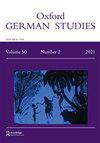The Politics of Romanticism: Novalis and the White Rose
IF 0.1
3区 文学
0 LITERATURE, GERMAN, DUTCH, SCANDINAVIAN
引用次数: 0
Abstract
Alexander Schmorell’s and Hans Scholl’s use of Novalis’s Die Christenheit oder Europa in the fourth White Rose pamphlet of summer 1942 has previously been read as being indebted to the strength of Novalis’s oracular rhetoric. This article contextualises Schmorell’s and Scholl’s use of Novalis by clarifying how it deviates from the reception of Romanticism and specifically from the reception of Novalis in the early twentieth century. Romanticism acted — if only uneasily and reductively — as a point of identification for the development of a narrative of the cultural nation under National Socialism and has continued to be subject to a simplistic teleological narrative of how Romanticism’s elements of irrationalism, antisemitism, and nationalism led to National Socialism. In their reading of Novalis, Schmorell and Scholl are an instructive example of active reception: they re-activate the dormant political implications of Novalis’s work, which had previously been obscured by the persistent myth of Novalis. Their use of Die Christenheit oder Europa stems from the text’s fusion of ideals of a unified Christian community and Europe. Schmorell and Scholl expand on Novalis to include a vision of a pan-European confederation as an alternative to the aggressive, expansionist nationalism under the Nazi regime.浪漫主义政治:诺瓦利斯与白玫瑰
亚历山大·施莫雷尔(Alexander Schmorell)和汉斯·朔尔(Hans Scholl。本文通过澄清Schmorell和Scholl对Novalis的使用如何偏离浪漫主义的接受,特别是20世纪初对Novali的接受,将其置于语境中。浪漫主义作为国家社会主义下文化国家叙事发展的一个认同点,即使只是不安和还原性的,它仍然受制于浪漫主义的非理性主义、反犹太主义和民族主义元素如何导致国家社会主义的简单目的论叙事。Schmorell和Scholl在阅读Novalis时,是积极接受的一个有启发性的例子:他们重新激活了Novalis作品中休眠的政治含义,而这一含义此前被Novalis的持续神话所掩盖。他们对Die Christenheit or Europa的使用源于文本对统一基督教社区和欧洲理想的融合。Schmorell和Scholl对Novalis进行了扩展,将泛欧洲联盟作为纳粹政权下侵略性扩张主义民族主义的替代方案。
本文章由计算机程序翻译,如有差异,请以英文原文为准。
求助全文
约1分钟内获得全文
求助全文
来源期刊

OXFORD GERMAN STUDIES
LITERATURE, GERMAN, DUTCH, SCANDINAVIAN-
CiteScore
0.10
自引率
50.00%
发文量
2
期刊介绍:
Oxford German Studies is a fully refereed journal, and publishes in English and German, aiming to present contributions from all countries and to represent as wide a range of topics and approaches throughout German studies as can be achieved. The thematic coverage of the journal continues to be based on an inclusive conception of German studies, centred on the study of German literature from the Middle Ages to the present, but extending a warm welcome to interdisciplinary and comparative topics, and to contributions from neighbouring areas such as language study and linguistics, history, philosophy, sociology, music, and art history. The editors are literary scholars, but seek advice from specialists in other areas as appropriate.
 求助内容:
求助内容: 应助结果提醒方式:
应助结果提醒方式:


